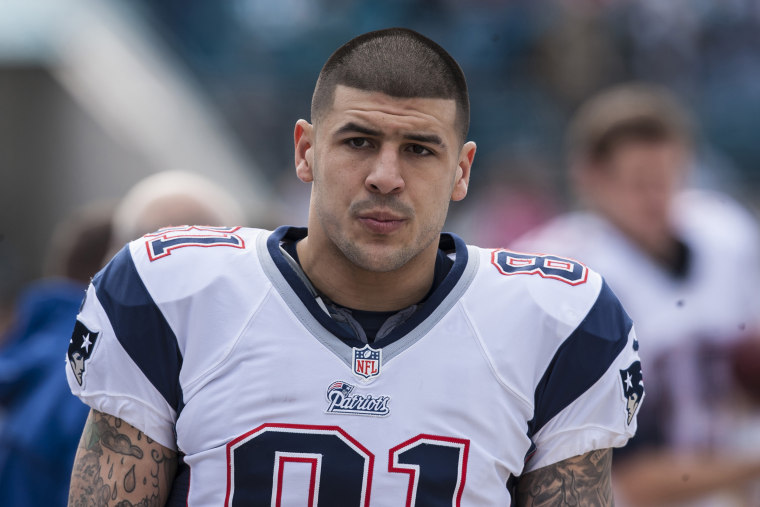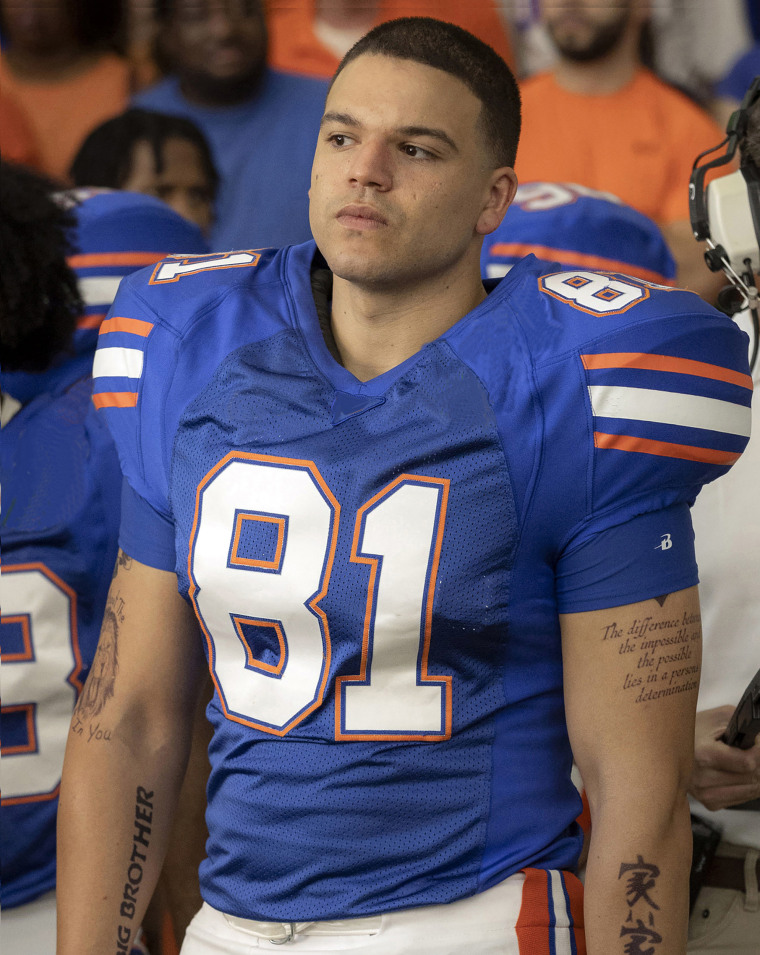'American Sports Story' re-examines the rise and fall of NFL star Aaron Hernandez (original) (raw)
Nearly a decade after Aaron Hernandez was convicted of killing semi-professional football player Odin Lloyd, the boyfriend of his fiancée’s sister, in a highly publicized trial, the former New England Patriot is getting the limited-series treatment in a new installment of Ryan Murphy’s buzzy “American Story” franchise.
Based on the Boston Globe and Wondery podcast “Gladiator: Aaron Hernandez and Football Inc.” and adapted by Stuart Zicherman, “American Sports Story,” which premieres Tuesday on FX, chronicles Hernandez’s meteoric rise to NFL superstardom and his stunning fall from grace after his arrest and eventual conviction of first-degree murder in 2015. Days after being acquitted in a second trial on charges of shooting two men in a car near a Boston nightclub, Hernandez died by suicide inside a Massachusetts maximum security prison in 2017.
“We tend to, in our culture, label people as one thing. Aaron Hernandez was a monster, a killer — and that’s just the way people talked about him. But no one’s born a monster or a killer,” Zicherman told NBC News.
“American Sports Story” attempts to contextualize the events leading up to Hernandez’s violent crime, Zicherman added, while raising larger questions about the complicity of a “sports-devouring” culture that enables bad behavior by protecting top athletes from being held accountable for their actions.
“If it weren’t for our desire to see people that we like win, they wouldn’t feel so brazen in their actions,” said Josh Andrés Rivera, who plays Hernandez from age 16 until his death at 27. “I think it’s important to watch the show with the lens that there’s some societal culpability in how these things happen and how people contribute to the making and breaking and the rise and fall of different prominent figures.”
Murphy and his co-producers Nina Jacobson and Brad Simpson first approached Zicherman about adapting Hernandez’s life story for an upcoming season of “American Crime Story.” But whereas past seasons of “Crime Story” — which have examined the murder trial of O.J. Simpson, the assassination of Gianni Versace and the Clinton-Lewinsky scandal — have explored the cultural impact of those historical events on American society at large, Hernandez’s case represented a way into a specific conversation about sports culture, prompting Zicherman to create a new extension of Murphy’s franchise.
As a sports fan, Zicherman thought he knew Hernandez’s story. But early in his research process, Zicherman listened to tapes of Hernandez’s jailhouse phone calls, which the Boston Globe’s Spotlight team had acquired during its investigation, and realized that he spoke and acted differently with each member of his inner circle.
Hernandez’s inherently — and, at times, contradictory — “chameleonic” nature then served as a jumping-off point for Zicherman, who was keen to shed light on the parts of Hernandez that most people are still unaware of. Over the course of 10 episodes, “Sports Story” explores Hernandez’s struggles with sexuality; how his upbringing in a violent household shaped his disposition on and off the field; and how his brain injuries were exacerbated by his drug use, resulting in a posthumous diagnosis of the degenerate brain disease chronic traumatic encephalopathy, or CTE.
Zicherman said he and his writers explored the disparate strands of Hernandez’s personal and professional identities, but he said they all boil down to a search for authenticity.
“This is a story about someone who could never really be his authentic self because of the body he was born into, because of the world he was born into, because of how good of an athlete he was,” he said. “We all, at different times of our lives, are trying to figure out who we are, and for him, unfortunately, there was no room for that. So you end up with a lot of secrets, and I think those secrets become punishing over time.”
Rivera, who is best known for his starring roles in Steven Spielberg’s remake of “West Side Story” and last year’s “Hunger Games” prequel, said he explored how these secrets might manifest for Hernandez.
“Something that I thought about a lot was how stressful it would be to have any side of yourself that you feel like you have to run away from or repress, and what that would do to a person’s psyche in general,” he said. “A big part of how the show explores it is just feeling like this character belongs nowhere, or feels like he belongs nowhere.”

Aaron Hernandez in Jacksonville, Fla., on Dec. 23, 2012.Michael DeHoog / Getty Images file
In the years since his death, Hernandez’s sexuality has been the subject of much speculation, with some of his loved ones claiming he had come out as gay. His high school teammate Dennis SanSoucie alleged he and Hernandez had a secret sexual relationship as teenagers. The prosecution in Hernandez’s second murder trial even considered raising the issue of his sexual orientation in open court. But despite reportedly feeling attraction to other men, Hernandez reportedly had a history of going on anti-gay tirades.
“A person struggling with his sexuality in the NFL when Aaron played in 2010, 2011, would not have been tolerated, not one bit,” Zicherman said. “It wasn’t tolerated in the Florida locker room. It wasn’t tolerated in the NFL. Maybe that’s different now, I hope. I don’t know. But I know that for him, there was no room for him to explore his identity whatsoever.”
In the series, Hernandez falls for a man named Chris (Jake Cannavale) while publicly dating his future fiancée, Shayanna Jenkins (Jaylen Barron).
Zicherman, who still doesn’t “necessarily believe” the football star would choose to volunteer such an intimate secret to those around him, pointed out that Hernandez never publicly declared his sexuality, but the showrunner also didn’t want to portray the threat of being outed as justification for Hernandez’s violent actions.
“He had a really strong love for Shayanna, and he built a family with her,” Zicherman said. “Maybe he felt more authentic in certain relationships with men, but I think he was figuring it out. I don’t think people know how many secrets he had, and to live with the pressure of that must’ve been unbearable while trying to put up a public persona.”
In each of the intimate scenes, Rivera felt it was important for his version of Hernandez “to have this undercurrent of discomfort, regardless of the gender of the person that he’s pursuing or exploring with.” The actor intentionally chose to make Hernandez’s intimate scenes with SanSoucie in the first episode, when their exploration of sexuality is still tinged with a youthful innocence, as playful as possible. But as Hernandez’s profile rises and he begins to have more to lose, “I wanted there to be this weird, almost ominous, uncomfortable veil over it. There is a piece of him that’s just not ever really fully willing to just be,” he explained.

Josh Rivera as Aaron Hernandez in "American Sports Story: Aaron Hernandez." Eric Liebowitz / FX
Rivera noted that “Sports Story” is not intended to justify or defend Hernandez’s actions, but rather shows the confluence of factors that could have conceivably led him to commit murder.
Zicherman speculated that the normalization of violence, paired with the toxically masculine ideals that his father instilled in him, ultimately, wreaked havoc on Hernandez’s life, and his drug use only contributed to his mania and paranoia. After losing his father at an early age, “I think he was always looking for a father figure,” Zicherman said. “In football, because you’re surrounded by coaches, agents and people that put their arms around you and take care of you, I think it was a world where people were promising him a fatherly role they were not ready to deliver.”
The cast and creative team of “Sports Story” chose not to reach out to any of the real-life people involved in Hernandez’s case, instead relying on the extensive research from Boston Globe journalists. But they acknowledge that there is an inherent risk in retelling a story that is still relatively fresh in the cultural conversation and could force the families of the victims to reopen a painful chapter that they would rather keep closed.
Rivera admitted he is feeling “a little bit nervous” but “cautiously optimistic” about the reception of the series.
“My ideal dream scenario is that everybody feels relatively honored, and the core idea of what we’re trying to get across with our show is received. I’m hoping that it’s received in a positive way, but it doesn’t always work out that way,” he said.
While “Sports Story” is a fictionalized version of a true story, the writers endeavored to “capture the essence of each character,” Zicherman said. “We tried to write some scenes and some moments for the victims and the victims’ families and try to represent them. But you do your very, very best to stay as close to what you believe is the essence of the story and hope it doesn’t offend or hurt anyone.”
For more from NBC Out, sign up for our weekly newsletter.
Max Gao
Max Gao is a freelance entertainment and sports journalist based in Toronto. He has written for NBC News, The New York Times, the Los Angeles Times, Sports Illustrated, The Daily Beast, Harper's Bazaar, Elle, Men's Health, Teen Vogue and W Magazine.